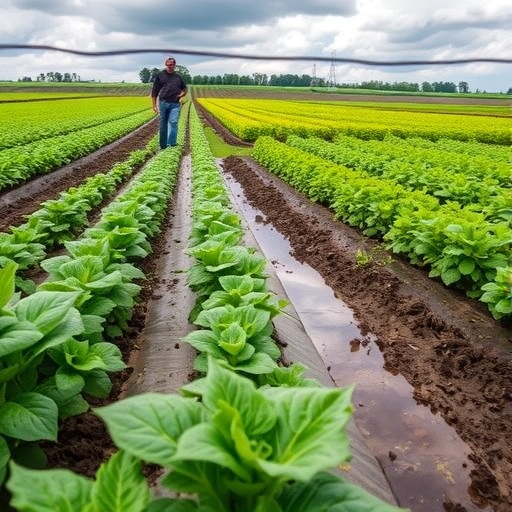In an era where climate change is an undeniable reality, the need for adaptive strategies in agriculture has never been more pressing. A recent study by Veisi, Darijani, and Khoshbakht, published in Discover Agriculture, delves into this urgent matter, bringing to light an array of innovative approaches designed to bolster agricultural resilience. This research emphasizes the transition from perception to actionable policy, illustrating how understanding climate impact can catalyze effective agricultural adaptation strategies.
The researchers begin by establishing a clear connection between climate variability and agricultural production. They highlight how changing weather patterns, increased frequency of extreme weather events, and shifting pest populations can disrupt food security. The implications are profound, not only affecting crop yields but also threatening the livelihoods of millions of farmers. Understanding this relationship is crucial for policymakers who must devise strategies that allow agriculture to thrive even under changing climatic conditions.
One of the pivotal adaptations the study identifies is the integration of climate-resilient crop varieties. By selecting and cultivating plants that can withstand droughts, floods, and other climate-related stresses, farmers can safeguard their food production against the unpredictabilities of the environment. The study emphasizes ongoing research in plant genetics, which seeks to develop varieties that are not only hardier but also innovative, adjusting nutritional profiles to meet changing dietary needs of populations worldwide.
Another critical aspect discussed is the role of sustainable farming practices. The research presented highlights techniques such as crop rotation, polyculture, and organic farming as beneficial practices that enhance soil health and reduce dependency on chemical inputs. These methods not only mitigate the environmental impacts of agriculture but also improve resiliency against climatic shocks. Farmers who adopt these practices can help stabilize yields and increase biodiversity, thereby contributing to a more sustainable agricultural ecosystem.
Furthermore, the study underscores the importance of agroecological approaches in enhancing resilience in agricultural systems. This involves creating farming systems that work in harmony with nature. Implementing strategies that promote biodiversity, soil conservation, and integrated pest management are all components of agroecology that the researchers advocate for. These practices not only minimize environmental degradation but also empower farming communities to be more adaptive to climate changes, ensuring food security for future generations.
The researchers also highlight the necessity for effective knowledge transfer and education among farmers. Bridging the gap between scientific research and practical application in the field is paramount. The role of agricultural extension services is crucial, as they provide farmers with the latest information on best practices and innovative technologies suited for their specific environmental contexts. This dissemination of knowledge facilitates a proactive stance on adaptation and equips farmers with the tools they need to combat climate challenges effectively.
In addition to these practical strategies, the study examines the policy landscape, advocating for frameworks that support agricultural resilience. Policymakers are urged to prioritize investments in research and development, providing subsidies for the adoption of resilient practices and ensuring that farmers have access to the necessary resources. Additionally, fostering partnerships between governments, research institutions, and agricultural stakeholders could catalyze collective action towards climate adaptation.
Moreover, the implications of climate change are not uniform across different regions. The study acknowledges the fact that local contexts and specific vulnerabilities must inform adaptation strategies. This nuanced approach ensures that solutions are tailored to the unique challenges faced by communities, rather than adopting a one-size-fits-all solution. It is vital for policies to be context-sensitive, recognizing the need for diverse approaches that reflect local ecologies and cultures.
As part of this broad examination, the researchers also delve into the economic aspects of adaptation strategies. The investment in resilient agricultural systems can potentially yield significant economic return, not only securing food supply but also creating jobs within rural communities. Financial mechanisms, such as insurance programs for extreme weather events, can provide farmers with the safety net they need to support their livelihoods amidst uncertainty.
Looking ahead, the study signals the importance of continued research in the intersection of agriculture and climate science. As new challenges emerge, ongoing exploration will be essential to developing adaptive strategies that can evolve with changing climatic conditions. This iterative process of learning and adaptation is fundamental to enhancing agricultural resilience and ensuring global food security.
In conclusion, the transformation from perception to policy is essential for fostering resilient agricultural systems capable of tackling the threats posed by climate change. The findings of this study advocate for a multifaceted approach, combining scientific innovation, sustainable practices, education, and supportive policies. By adopting these strategies, the agricultural sector can not only survive but thrive in the face of adversity, supporting communities worldwide as they navigate an uncertain climate future.
As this vital research underscores, the path to resilience is not merely a matter of scientific inquiry but a call to action. Policymakers, researchers, and farmers alike must unite to forge a sustainable agricultural future that can withstand the pressures of a changing climate, safeguarding both our food systems and the livelihoods dependent on them.
Subject of Research: Agricultural resilience and adaptation strategies in response to climate change.
Article Title: From perception to policy: adaptation strategies for agricultural resilience in a changing climate.
Article References:
Veisi, H., Darijani, F., Khoshbakht, K. et al. From perception to policy: adaptation strategies for agricultural resilience in a changing climate.
Discov Agric 3, 158 (2025). https://doi.org/10.1007/s44279-025-00259-8
Image Credits: AI Generated
DOI:
Keywords: Climate change, agricultural resilience, adaptation strategies, sustainable practices, agroecology, policy development.




